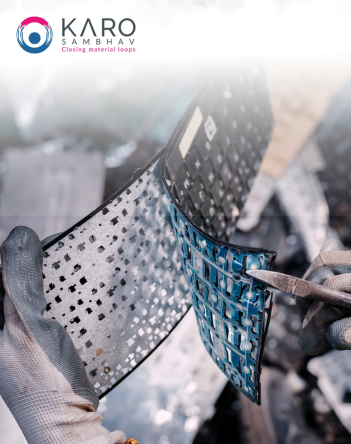Karo Sambhav collaborates with leading organisations to jointly develop industry frameworks, standards, governance mechanisms, systems and processes that advance the transition to circular economy. know more about our alliances.
Lead-acid batteries are one of the world's earliest and most widely popular rechargeable battery technologies. First introduced by French Scientist Gaton Plante in 1859, the batteries have been a boon in the commercial space, especially in the automobile sector. The cells are used in an array of applications, such as ignition power sources for automobiles, small-scale power storage units like UPS systems, and large-scale grid power systems. Unfortunately, greater usage of lead-acid batteries implies higher volumes of battery waste. Are you aware of the consequences of lead-acid-type batteries in landfills? Wondering if batteries recycling is any good either? Little did you know that unregulated extraction and recycling of lead from batteries is hideous and poisoning for the environment. In other words, the process of recycling spent lead-acid batteries are identified as one of the most polluting processes ever.
Are you curious to find out how? Before delving deep into the ins and outs of battery waste recycling, it is worth understanding the composition of lead-acid batteries first.
It is a no-brainer that lead-acid batteries comprise large ratios of lead and sulphuric acid. The lead plates fitted in the batteries represent a negative and a positive charge. Further, to activate the plates and charge the battery, it is dipped in a strong diluted concoction of sulphuric acid and water. Besides, the stacked cells also comprise minor fractions of calcium, tin, antimony, and lead sulphate. Once the primary construction of the lead-acid cells is complete, the battery is neatly packaged in a plastic container, ready for dispatch and use.
Now that you are aware of the composition of lead-acid batteries, aren't you eager to find out why battery recycling in India is a need of the hour? According to reports, the global industry of lead-acid batteries is worth a whopping $65 billion. The market in India alone was last valued at $4.86 billion in 2020-2021 and is projected to hit $7.6 billion by 2023. The growing size of the lead-acid battery market makes recycling of batteries all the more evident and critical.
Battery waste recycling in India is expected to transform the deteriorating scenes of landfills and cut down the impacts of toxic pollution plaguing the environment and human health. Let's quickly read a few benefits of battery recycling:
Have you heard of circular economy? It is a more strategic, robust, and tech-enabled alternative to recycling. One of the primary goals of circular economy is to ensure the maximum conservation of resources and increased span of end-of-life products. Unlike a common assumption, resources extracted from natural ores are not infinite in nature. The growing surge in technology directly increases the demand for products powered by batteries. Sadly, this drives up the costs and consequences of excessive mining. Battery waste recycling encourages the optimum extraction of raw materials from spent and trashed batteries. The raw materials sourced are further forwarded to manufacturing industries for renewed use.
It is no surprise that lesser mining and amplified use of upcycled resources lower the costs of manufacturing batteries.
Carelessly trashing batteries in the open is toxic and harmful. The chemicals and substances in the batteries naturally drain out into the ground, contaminating the soil, groundwater, and of course, air. Inhaling poisonous substances affects the respiratory system. It is also a leading cause of cancer. Besides toxic chemicals, lead-acid batteries also comprise elements that are highly combustible in nature. It could cause fire explosions and, worse, damage the ecosystem by large.
Now that the importance of battery waste recycling has been explained let's understand how lead-acid batteries are truly reprocessed.
To begin with, batteries are crushed into tiny fragments and pieces, no more than the size of a nickel, in equipped hammer mills. Once the components are sifted out, the crushed battery parts are inserted in a vat where materials like plastic and lead are segregated using a water bath. Further, the suphuric acid in batteries is washed off. Of course, each of the materials distinctively separated post the process is individually recycled. For example, the plastic components are sent off to a plastic recycler, where it is first melted into a liquid-like state and reprocessed via an extruder into plastic pellets that are easily utilised to manufacture battery cases. On the other hand, the lead components are refurbished in a smelter to get rid of the impurities and grit, and handed out to the manufacturing companies to create new batteries.
Although strict battery waste rules have been put in place for years now, almost 90% of lead-acid batteries are recycled by the informal sectors using unhealthy and unregulated practices. Reports suggest that more than 30,000 informal battery recycling sites are in active operation worldwide. As a consequence, lead, the primary heavy metal in batteries, leaks into the environment, causing more damage than you know. Very few people are aware that lead is reckoned as a potential neurotoxin. Unfortunately, even the slightest exposure to the metal decreases IQ scores and attention span, mostly in children. Hence, eminent PROs like Karo Sambhav are dedicated to streamlining battery waste recycling in an organised, controlled, and strategic manner.
Karo Sambhav collaborates with leading organisations to jointly develop industry frameworks, standards, governance mechanisms, systems and processes that advance the transition to circular economy. know more about our alliances.





